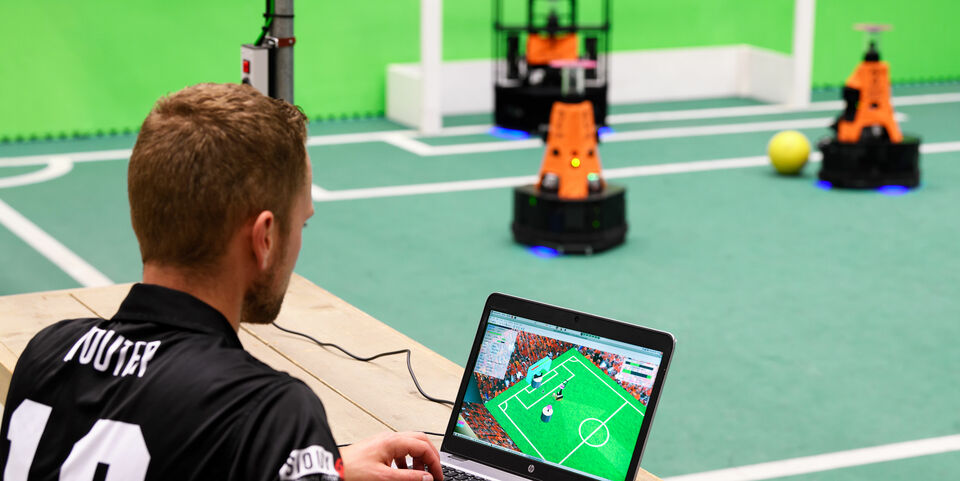Tech United has to make do with a digital World Championship
No competition with other teams, no useful networking drinks, and the team won’t be able to test a new code in its robots either. Tech United has had a rough year due to corona, to say the least. But the student team, which has been working on the development of service and soccer robots for years, keeps it spirit up: a World Championship is scheduled to take place from 22 to 28 June. In a digital setting, admittedly, but that certainly won’t affect the team’s ambition to win.
“We find ourselves in a strange situation due to corona,” says Ainse Kokkelmans, Master’s student at Mechanical Engineering and team leader at Tech United. “There are numerous measures we have to take into account, but you can get used to anything.” Kokkelmans, who has been in charge of the team for over a year now, says that it was impossible to organize physical meetings during the past year. “Corona seriously got in our way. Travelling was difficult as well, obviously. It was a real bummer.” However, it didn’t keep the students from remaining actively involved. “We even welcomed eight new members on our team, whereas the number of new members never surpassed three during previous years.”
Testing a code
The team obviously likes to win the smaller competitions in which their soccer and service robots ‘battle it out’ at several locations across Europe, Kokkelmans says, “but what’s more important is that the team has the opportunity to test the code that was entered into the robots. "Certain parts of the code can only be tested when a robot interacts with another robot, such as during those competitions. Only then can we determine whether the code functions at one hundred percent. That’s a natural process with encoding.” In short, the pandemic has made it impossible for the team to perform that litmus test – to see whether a robot functions properly.
The lack of physical events did however lead to new ideas and innovations, which the team got started on. Kokkelmans: “A Master’s student is currently working on a digital simulation of a situation, which makes remote competition possible. In time, this will allow us to successfully test that code, making physical meetings less important as a result.” Nevertheless, she doesn’t think that everything will become digital in the future. “The year 2050 was once established as a target for soccer robots. By that date, we want to have created robots that can compete with humans.”
Innovation
Until that time, the team can only dream of physical contests. However, the upcoming World Championship is scheduled to take place in June. The part where the teams compete against each other on the soccer pitch or in a service situation has unfortunately been cancelled. The tournament now roughly revolves around two parts: the technical challenge, for which the teams have to come up with a new concept, and the scientific challenge, which challenges the teams so present their scientific progress. For this, no opponents are required.
Read on under the photo.
The most important part may have been cancelled, but Kokkelmans and her team mates remain optimistic. “We simply continue with what we were doing, and we regularly talk to one another. The matches will resume eventually, and this will also allow us to innovate at a faster pace again.”
Innovation has by no means come to a halt, incidentally. The number of Bachelor Final Projects (BEPs), during which students carry out research into, among other things, movements of robots, is clearly growing. Kokkelmans: “Currently, robots still look at other robots as small boxes, without the dynamic movements of humans. We are investigating this and hope to encode this soon, so that our robots will be able to see their opponents even better.”




Discussion